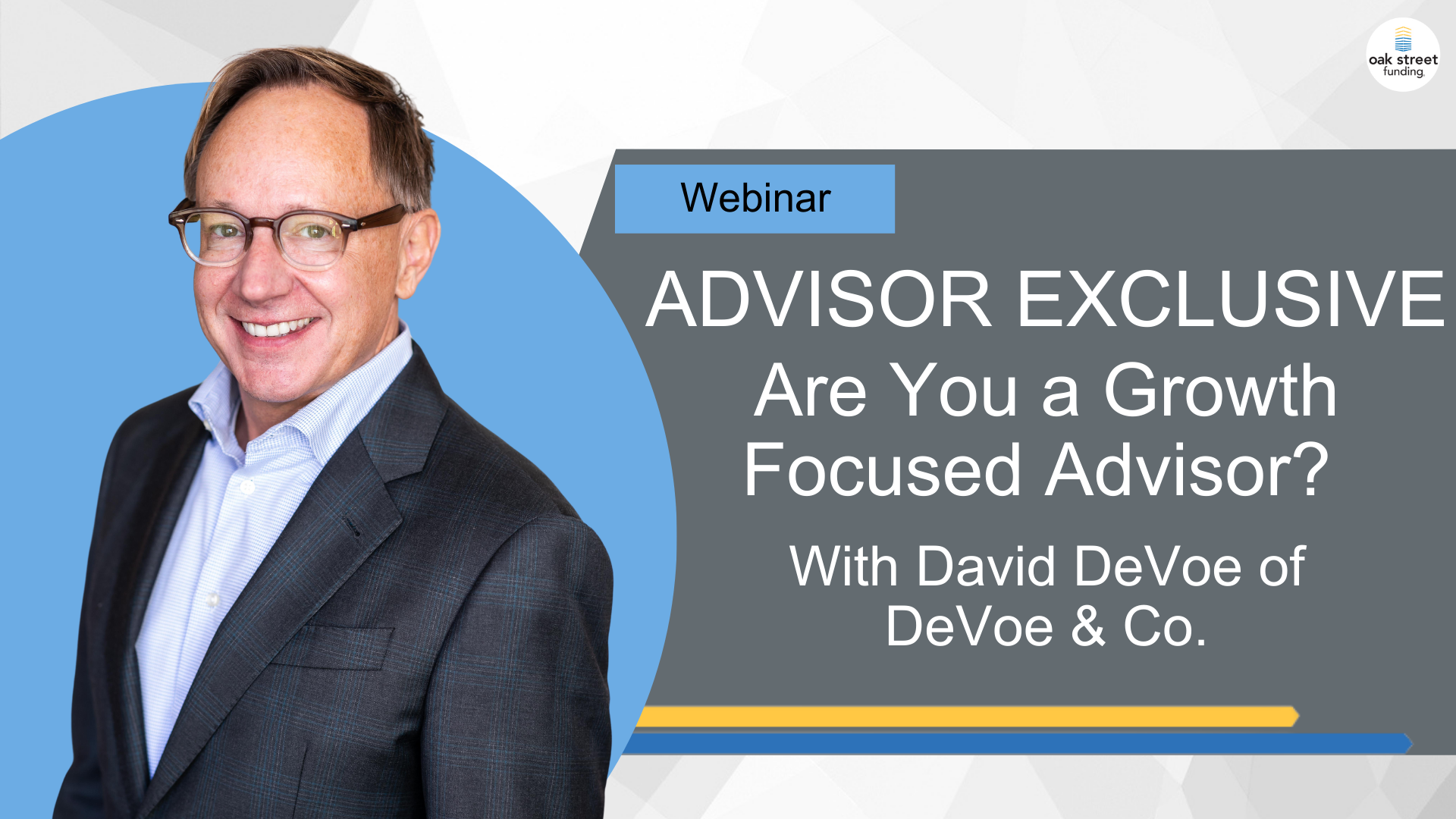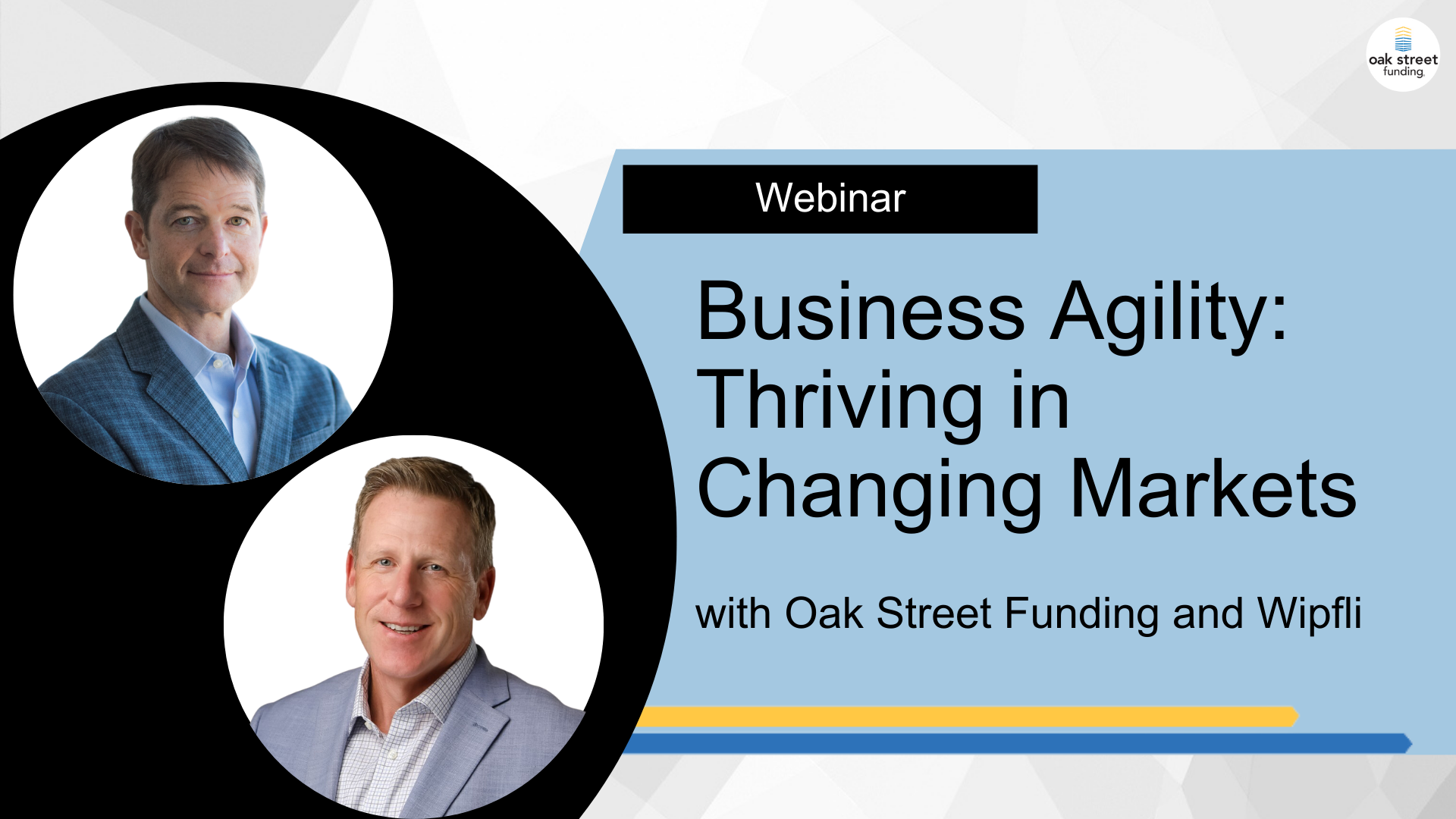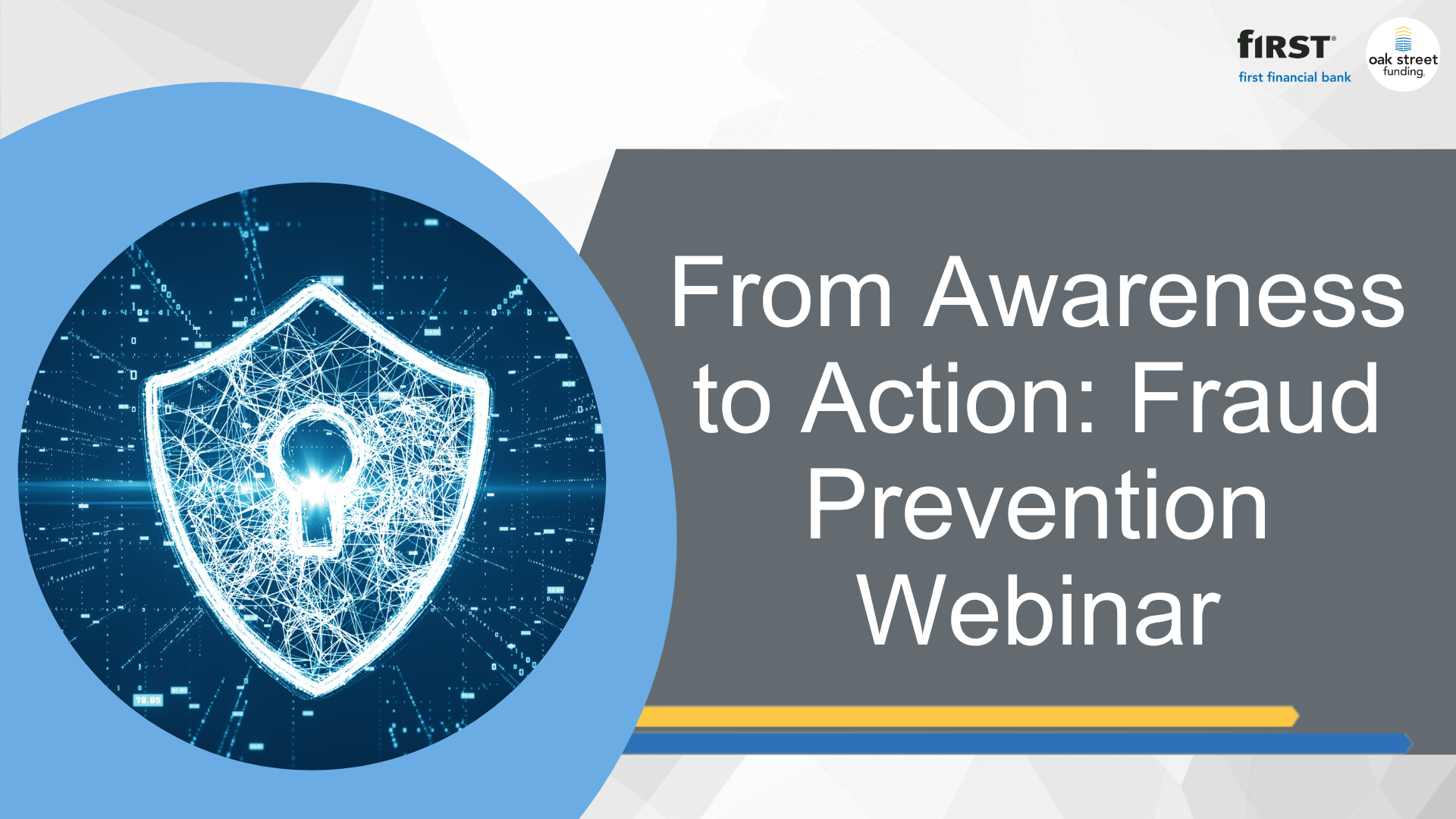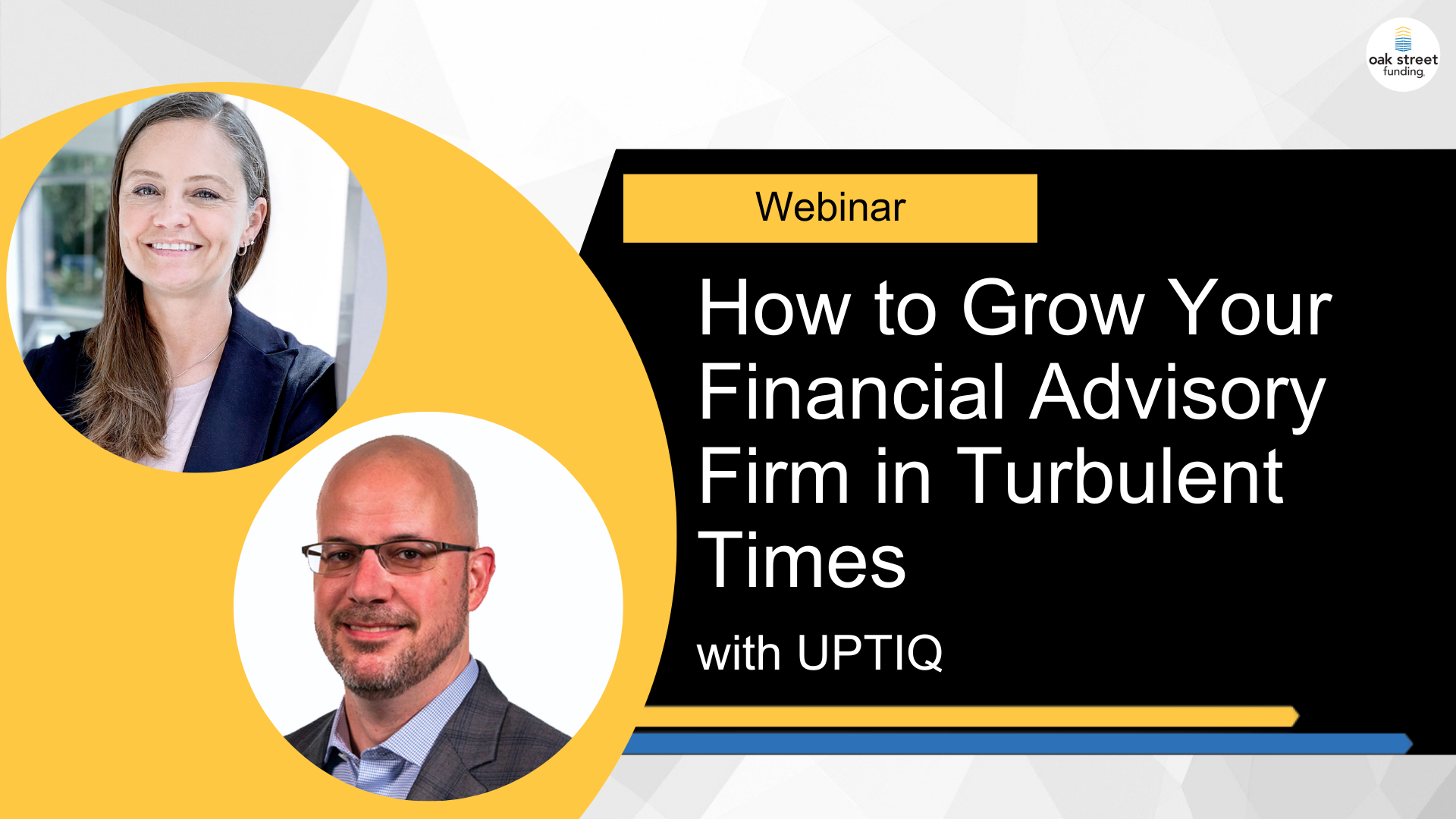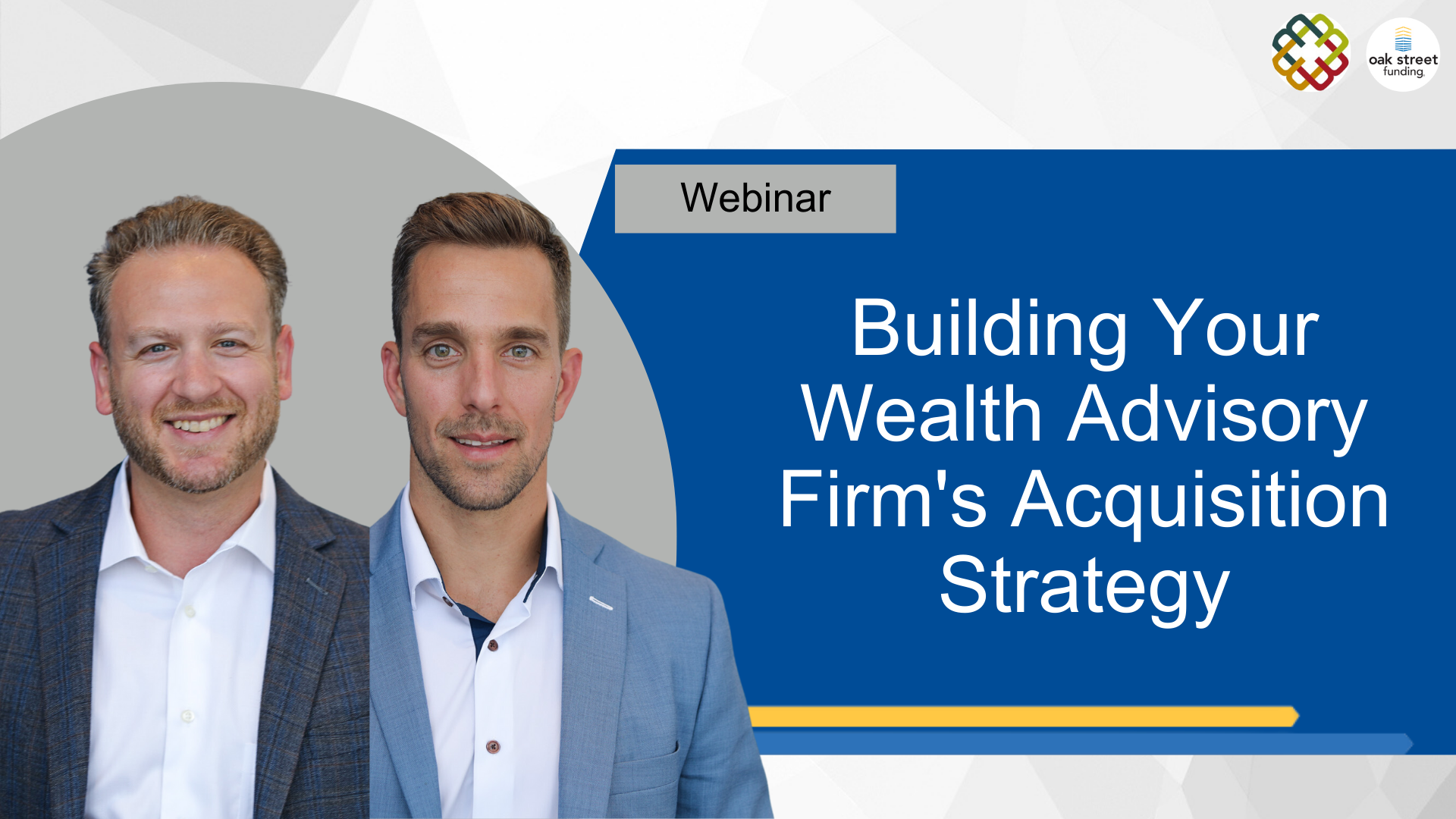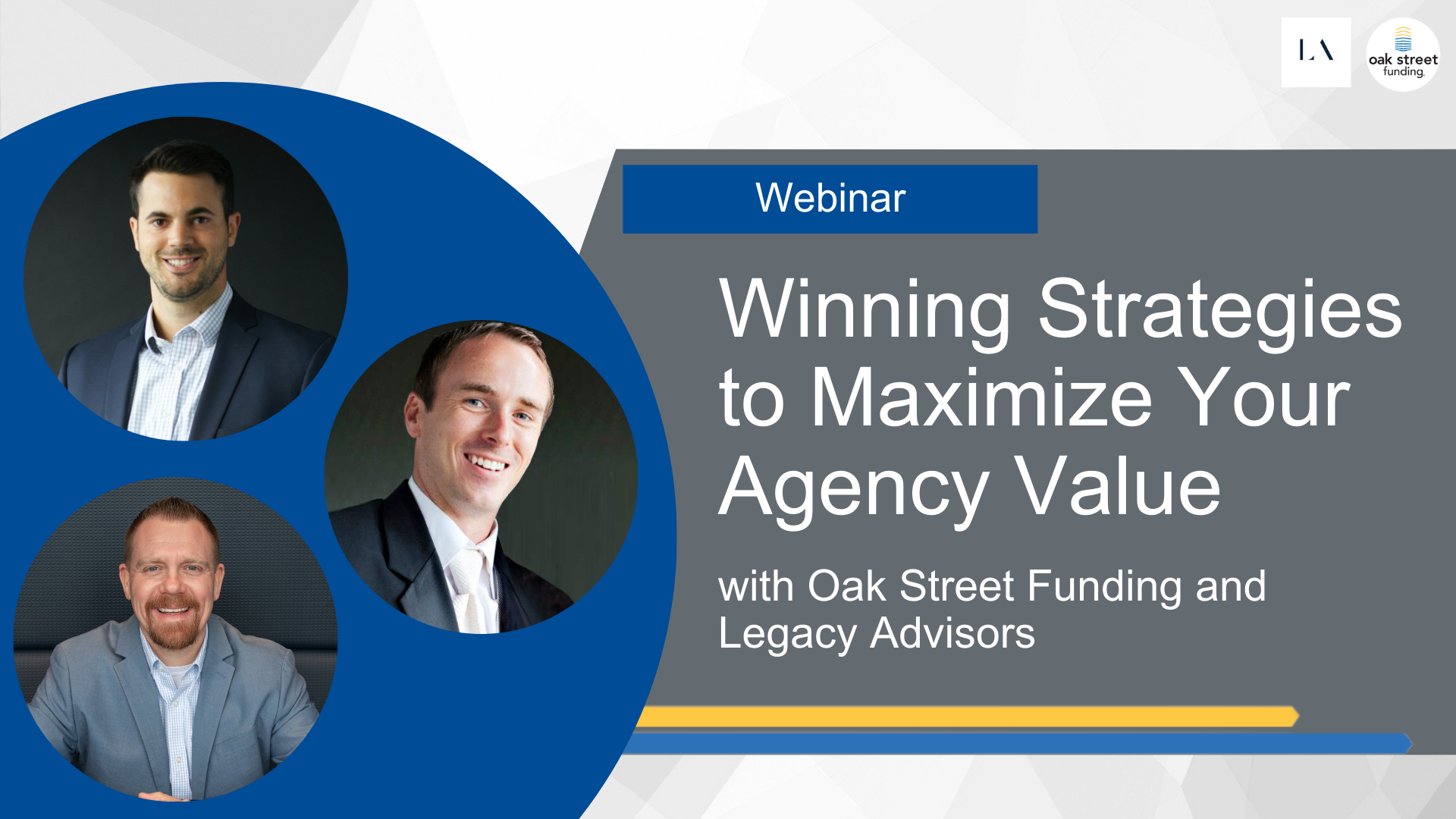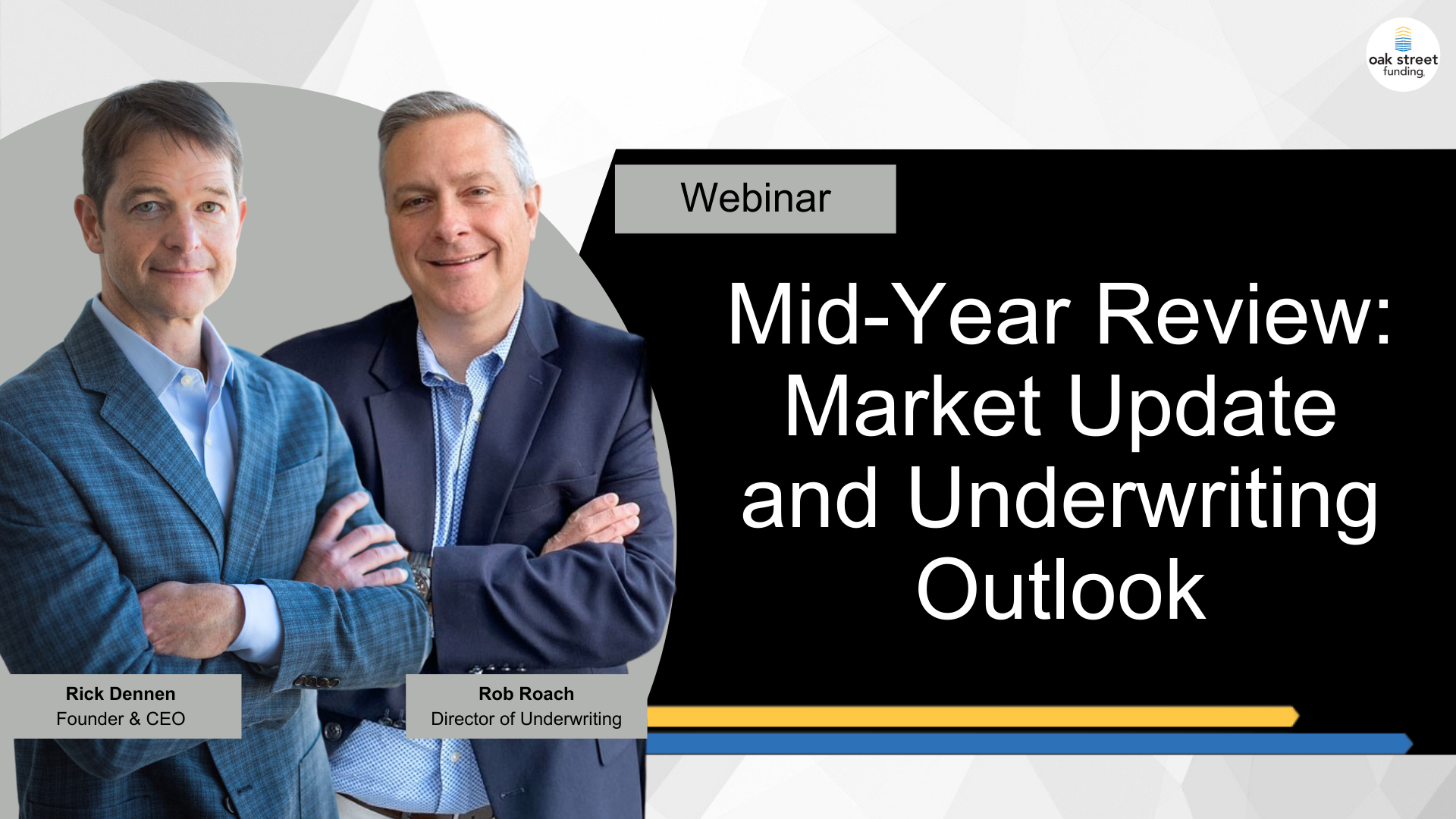ADVISOR EXCLUSIVE: Are You a Growth Focused Advisor? With David DeVoe of DeVoe & Co.
- 0.5
- 1
- 1.25
- 1.5
- 1.75
- 2
Kirsten Petras: Hello, everyone, and thank you for joining us today for an exclusive conversation and interview with David DeVoe, founder and CEO of DeVoe & Company. I'm Kirsten Petras from Oak Street Funding and I am happy to be here and have this conversation today, primarily shaped by the questions you submitted when you registered. You can also follow us on a live experience on Twitter at @OSFunding and submit additional questions there if you'd like. Within the next couple of business days, you'll receive a follow-up email with a link to this recording and our contact information if you'd like to continue a private conversation. So let's get started. For those of you who are not familiar with David, David DeVoe has been a sought-after thought leader on RIA practice management for 18 years, so much so that Barron's named him the "RIA M&A Guru." But for those of us who do know him, David is someone who makes spreadsheets exciting and can get the whole room excited and enthusiastic about data and trends when he starts sharing his insights, so basically, he makes nerds cool. And if you notice, he's got that guitar back there, so maybe before the end of this time together, he'll play us a little song. David, it is so great to see you today. Thank you for being with us.
David DeVoe: It's good to be here, good to be called a nerd. I'll take that as a compliment.
Kirsten Petras: Well, you certainly have turned nerds into something cool in this day and age. Thank you to those of you who are actually driving today's conversations with your submitted questions. From what you submitted, we found that the questions can be put into three categories, industry trends, M&A and inorganic growth, and organic growth. But before we get to the questions, as the guru, David, would you share your thoughts from a more macro level of the impact of current global and economic situations that are happening and ebbing and flowing every day, and how these may be impacting any of these three themes? What do you see here?
David DeVoe: Yeah, I mean, it's a surreal world these days. We've come out of the surreality, if that's a word, of COVID and what we all lived through the last couple of years, and now, sure enough, we have this Ukraine, Russia, World War III situation, we have inflation, which is just running away, interest rate changes. A lot of people expect we're going to hit a recession. The surrealness is less inaudible and more, what's a good analogy, more negative. So yeah, I think this is the reality of the marketplace. Advisors have their own set of challenges to communicate effectively with their clients. How will it affect mergers and acquisitions? The interest rates in particular could have an impact if they continue to go up. They need to go up pretty dramatically before that happens. It won't affect private equities' interests. Private equity has already baked that into their assessment for years, and they are key driver mergers and acquisitions. But when we see sustained periods of volatility in the stock market or significant declines in the stock market, that, typically, has a dampening effect on mergers and acquisitions. Matter of fact, considerable distraction in the universe can affect mergers and acquisitions as well, especially for small and midsize firms, because they're overseeing client relationships as well as running the strategy of the firm, and they focus on what's most important, which is being able to guide their clients through these traumatic times. So it'll be an interesting period, but I don't think it's going to have a profound near-term effect, based on what we've seen today.
Kirsten Petras: Well, and you can imagine, from our seat as a lender, the interest rate movement is top of mind for many people, and how that will affect their approach, we're not getting a lot of feedback that people are stopping their strategies about moving forward through something like M&A and growing that way, but rather, how are they going to structure, moving forward? How are they going to optimize the capital stack as they're putting their deals together? You've used that phrase, meta. I think you coined that phrase maybe the same day Facebook changed their name to Meta. Might have been there at your last event for that. But when you talk about that meta firm, can you give some insights to what you see there? And then, what is the advantage you see for smaller RIAs in today's space?
David DeVoe: Yeah, yeah. So meta RIAs, you're right. That was at our M&A + Summit a couple months ago, and talked about that meta, and then the next day, Google talked about the new name, so we joked about them stealing it from us. But yeah, meta, I mean, the term, it's an acronym from online gaming. So my son used to play Fortnite. Meta is a term they use for it. It's the Most Effective Tactics Available, so guys like Ninja that are really good at Fortnite, they're using the most effective tactics available. They figured out how to crack the code on that particular online game that they're doing, and they become a ninja. They become really, really good at it. Well, our space has its own set of ninjas now. There's about two dozen firms, about 25 firms in this industry out of 10,000 FCC- registered RIAs, that are really playing the meta game. They have sophisticated management teams. They're very methodical in terms of what they're doing. They're very thoughtful about how to be differentiated. They have great capital as well, that, in many cases, is private equity, but they almost have unlimited capital to do really interesting things and play the game differently. There's firms like Edelman and others, Edelman Financial Engines, that are truly spending tens of millions of dollars on marketing and AI and things like that to really do marketing differently and serve clients differently than they ever have, so this is a trend that's shaping the RIA space. I'm going to be provocative. These companies are going to be run better than your traditional RIA, they're going to grow faster than your traditional RIA, and here's where I get very provocative, they're going to serve clients better than your traditional RIA. And that can be a fun debate, hey, small is better, and all that stuff. Provocative thinking is interesting. It can force you to think about your business a little differently. But I think, how is it going to affect this space? I think it's a net positive. These firms are going to have greater influence on the space, but they're not going to dominate the space in the near term. So I don't think it's an existential threat to small or medium-sized firms. The barriers to entry are low, RIAs can serve their clients extremely well, even if you have a hundred million, 200, 500 million, so I don't think this is going to really affect the industry the way the travel industry was decimated by online travel. So it will impact it, but it doesn't mean anyone should be hanging up their spurs at this point.
Kirsten Petras: So it's going to impact it probably for the better, in terms of putting some best practices out there, but not completely cannibalize it, where you're left with just this very small segment of these very large firms.
David DeVoe: Yeah. I'd say one of the things that's happened is, a certain business maturity has occurred amongst a lot of advisors. You can run your own company, and I'm doing that. I'm an entrepreneur, just like all you folks. I love doing it, et cetera. At some point, you might decide, hey, I want to attach my caboose to one of these trains. They have all these scales and capability, or scale and capability, and so I think it's a greater option set. Over time, their best practices will trickle into the rest of the RIA spaces you just alluded to.
Kirsten Petras: So for a smaller firm, let's say less than $250 million, who is trying to achieve, maybe without the size, this meta mentality, what are some steps they could be taking to create that own culture and approach to business?
David DeVoe: The bar is being raised, so you just want to be thoughtful and methodical about how you run your business. Part of that gets into the service set. I've been doing this for 18, 19 years. Years ago, you'd do asset allocation and you'd say, "Hey, pay me 125 basis points." It's not really plain anymore. The fee compression that reporters love to talk about, and I love the reporters, but I've been doing this for 19 years, they keep talking about it. It's never really happened. Conversely, the service set has increased, so the typical firm that might be still charging, pick a number, a hundred and eighty, a hundred and twenty-five basis points, they're doing more for their clients. So from a service perspective, you want to think about the capabilities that you want to add, you want to make sure that you're creating a growth machine, right, that it's not just your charisma or your luck or... You happen to know how to do it. You really got to impart that wisdom, that knowledge, that acumen that you have, in your G2 and G3, and help these folks understand the technical components to how to grow the business, and ultimately, they can have their own way of doing it. But I think overall, the bar is being raised and advisory firms are just... It's a good thing. It's going to force people to run better businesses, which ultimately, will be great for clients, will be great for the staff, it creates better career paths, and ultimately, great for the US investing public.
Kirsten Petras: Thank you. And I just want to put a little bit of a final thought to some of the future trends, because of course, it wouldn't be a conversation with you without somebody asking about EBITDA multiples. So one of the questions we received was, how do you expect multiples to trend in the next 12 to 18 months, multiples of EBITDA?
David DeVoe: Yeah, I wish I had a crystal ball. That'd be so great. Yeah, I mean, where are we? Back in 2008, we saw, at the time, the all-time high for valuations. It dropped dramatically through mid-2008 and 2009, and it took about 10, 12 years to stagger back to these levels of 2008, which were irresponsible. It was a bubble back then. The people buying firms back then were not sophisticated. They didn't have great capital. They were just kind of drunk guy at the bar, throwing money around and without a plan, and a lot of those firms dissolve. Today's buyers are sophisticated, they're well capitalized, and the valuations they're paying have not only eclipsed what we saw back in 2008, but they're justifiable. These organizations today... and it's not everyone that's paying high valuations, so that's a great point that has just hit me. If you're selling to a firm down the street, they probably shouldn't, and oftentimes, can't be paying the valuations of some of these meta RIAs or serial acquirers of private-equity-backed firms, because these organizations have really designed a business that can make margins expand for anyone that they acquire and it can make their firms grow faster, any of the firms they acquire. So if you're able to increase margins and accelerate the growth of a company, then you can pay more. So we do have this wider-breadth evaluations in the marketplace, but yeah, these valuations not only eclipse that high, they've continued to go up. I don't know. I think the valuations are probably more likely to go down over time than further up over time. So 18 months from now, if we're doing the over-under, I'm not a sports guy, but sports people talk like that, my bet would be that valuations would likely go down as opposed to up.
Kirsten Petras: That might be a headline-grabbing statement right there, right, because I think there's a lot of uncertainty and disruption, and people are waiting, actually, for someone like you to make the first statement, so we'll see what the feedback comes as people are probably feverishly Twittering what you just said right now. And the future will tell us all what happens, right? If we can definitely bring anything from the last couple of years to the present day, is that we have to expect the unexpected, so thank you. As we move into this secondary theme of M&A and inorganic growth, a question that we received, and I think you and I probably hear chattered about sometimes during the network moments of events we often see each other at, is the thought about acquiring a CPA firm to gain clients and cross-sell. So the question is just, what are your thoughts on doing that as a strategy for expansion?
David DeVoe: There's so much intuitive, strategic power between a CPA and a wealth management firm. I mean, man alive, this is so great. You have insights into both sides of the balance sheet. One set of capabilities can be complimentary to the other. There's so much potential value empower here. I have worked with so many CPA/wealth management firms to try to optimize the business. There are some that do it well, but typically, there's a lot of friction points and challenges. Those CPAs are wired completely differently than RIAs. The economics, the growth trajectories, the profitability, all these things are very different, so it can be hard to incent good behavior across all points, it can be hard over time to reward people appropriately without some friction points. Most importantly, that concept of cross-sell is really challenging. I mean, I've worked at the Charles Schwabs and the American Expresses of the world, and cross-sell is the holy grail, but it's so hard to achieve, so often, those CPAs are reticent to make a referral to someone in-house. They feel like, whoa, that's too biased for me, or what if this person messes up the relationship? Because we're at the same company, that might reflect bad on me and I lose that relationship. So I think there's a lot of potential there, and it depends on what size of firm you're talking about, but I'd be careful about thinking, gee, a solution like this is necessarily the best way to solve a given issue. So it can be a challenge, but if you do it right, it can be really amazing.
Kirsten Petras: Yeah, so a couple of things I'm taking out of what you just shared there, it's got to have some pretty intentional critical alignment of how client relationships are being approached, and then trust within the team that you minimize that thought, if I have them come over here and talk to this person about their financial planning, that they're not going to provide the same level of service that I've been providing for all these years. So yeah, big, almost emotional aspects of how to handle clients and move forward one in one together that you don't always see on the checklist of things to be thinking about when you're acquiring a firm. A very tactical question somebody has asked is just simply, how to structure buy sell agreements?
David DeVoe: Yeah, yeah. So that's a complex question. I'd say a few things. One is, for someone who's running a smaller firm and you don't have your future successor in-house, which if you do, you got to communicate to that, you got to create that path, you got to get them in the cockpit, let them understand how to fly the plane and stuff, so you can't just have this theoretical construct. There's 5, 000 firms in the industry with under a hundred million, and often, if you have less than a hundred million, the majority of those firms do not have a G2 person in-house. So within that construct, or whether you're big or small and don't have that G2 in-house or your future successor, it's great to have a buy-sell agreement. If you get hit by the proverbial bus, your family, your heirs are taken care of. Most importantly, your clients, your staff are taken care of, or equally important, I should say. So you want to have one of those in place. There's a variety of things. You've got to realize that often, when these things are triggered, it's because of death or disability. When that happens, the company is under stress and duress. So often, there is a discount to the valuation because there's a higher degree of risk with this transition, so beware of that as you're crafting it. Sometimes they're reciprocal, like, we're running our own businesses and we both have our one-man bands, one-woman bands. We're like, "Hey, if you get hit by a bus, I'll run your business," and vice versa. So that continuity planning can be reciprocal. Other times, you're like, "No, I need a bigger company that can absorb my 30, 50, 60, a hundred clients," et cetera. There's a lot of strategic components to it, how is this trigger, when is it triggered, how is the business managed, how is it paid out, all that sort of stuff, so I encourage you... A lot of the stuff we're talking about, mergers, acquisition, succession planning, these are just critical aspects, and this is the time not to be penny- smart and pound- foolish. Lawyers can be helpful, but they'll often... Very respectfully to lawyers, if they've done it before, they'll take their template. It can be helpful to hire a consultant, like DeVoe & Co. or others, to help tailor that to your specific needs, ask some really intelligently- designed questions, figure out what you need. And then the lawyer can put it in a legalese, or sometimes the consulting firms do both. But yeah, it's an important thing. Don't kick that can down the road. It's really important to have in place if you do not have a successor already.
Kirsten Petras: Yeah, great point about talking to somebody like yourself, right, because you're going to prompt some questions of things that people don't want to think about, which is, I think, what stops them from actually taking the step. The idea of them not existing anymore and what that means for people often is scary enough for them not to even do this. And it is in those moments, having this stuff prepared will be so welcomed by those people who are in duress that day or for those months after, and they can keep things moving forward.
David DeVoe: We just went through COVID. We had something that's devastated the world. All of our lives were at risk. Capitalize on that negativity and internalize that to put that succession plan in place. It's not a theoretical construct, this get hit by a bus. There's all sorts of things that can inhibit our ability to continue.
Kirsten Petras: Absolutely. And we saw a direct effect of COVID basically scaring people into taking action. We saw a great increase of that next generation actually getting those shares and getting some of these wheels in motion. And it's unfortunate that it took something as scary as that, but I think that it's the fear of wanting to face it, that stops people, and it's nothing to be fearful of. It's just simply reality, right? Death and taxes, two things you can't avoid, so just be as prepared for it as you possibly can. So moving from that, that you need to take action, to who to take action with, our next question is, how long should I take to prepare my successor?
David DeVoe: Yeah, I'd say as long as possible. As you're running that business, you should be taking an ongoing inventory to say, "Hey, are there people here that can run the company, have the capacity to book management and leadership, as well as the tactical or technical skills?" And as you identify them, hopefully, more than one, you're starting to coach them, you're starting to have that communication, you're helping them. If not, you need to do that by sell or some variation of the theme and figure out who you can bring on at the appropriate time that can help run the business. But I encourage people to start immediately. Ideally, you have at least a year. Your business is precious. It's your most important asset. You are literally managing the life savings of your client. You want this machine to go really well, so establishing that set of successors, migrating equity over to them. But it's much more than that. It's starting to migrate management responsibilities, functional elements, you're starting to move over to them, and help them, as I said, get in the cockpit and be a thought partner, help them even make some of the critical decisions of the firm. I encourage our clients to seek to achieve self-obsolescence. So what does that mean? It means you're running the company, but you've done such a good job of migrating responsibilities and helping them get in the cockpit and starting to run the firm, to the point that you're no longer required in the organization. You're obsolete, which is a scary thought, right? But guess what, it's your company, so you're still there. So you no longer need to do anything, per se, theoretically, but you're still there. You're extra sauce. You're 40 hours a week doing whatever else, and that's where you can really start to unlock a lot of value and power in the firm, but it also enables you to be able to walk away on a given day. Maybe another concept is, that point of arrival will probably be reached when you say, "Hey, I'm going on sabbatical for two months, run the company without me."
Kirsten Petras: Yeah, like a trial run, almost. And you can go away knowing you can come back if needed because it's not final, but it gives people that spectrum to operate within a safety net. And I saw something fascinating on one of the social media platforms, that a library somewhere actually allows people time to check out a person, to learn about their experiences. And I think sometimes, when I talk to people about them not being able to really develop their successor, it's that they think they have to have this really robust training program or development program. And some of this, I think, just simply starts by sitting down with those people you identify as high-potential leaders and tell them the story of why you started it, really get them understanding some of the things that were important to you to build and run the business, and then connect what could be important to them as they continue the business. They're not having to start a business, they're having to continue and elevate the business from what you've built. So maybe it just starts with a simple conversation of idea sharing, and don't think of it having to be this big, formalized, I'm preparing my successor, and it's 36 months of classroom work to make it happen. But I love the sabbatical. I'd love to take one myself. Who wouldn't want to do two months backpacking through Europe or something? I'm going to go ahead and shift gears a little bit from inorganic and M&A talk to organic. Everyone doesn't have an M&A strategy. Everybody isn't necessarily at the stage of their career where, while it's important to have a successor identified, that is still pretty well down the road for them. But organic growth is something people should be driving almost daily. One of the questions that came was, please address organic growth and priority setting and then sound ways to execute on that, so when you see organic growth and the necessity of it, and then the things that you think should be prioritized to be impactful in growing a firm.
David DeVoe: Yeah, yeah. So I mean, growth is so important in this industry, and unfortunately, the organic growth of the industry has been compressing pretty dramatically over the last four years. Dimensional Fund Advisor has done some really good work of pulling apart the data, stripping out M&A, stripping out the market. And there's this decline from 9%, I think, in 2018 to 2017 to seven to four to three in 2020. Right now, they're working on 2021 data. But it's been this decline, and right now, the average RIA, if you strip out everything else, their organic growth is only 3%. This is not good. It's not good for the country either because as far as I'm concerned, the RIA community is the white cowboy hat and the good guys, and we want to save all the other investors from other models, I'll be crass, the wirehouses of the world, which I don't think all have clients' interests as their number one priority. DeVoe & Co. and we, as a community, should want to get more of that message out there and bring more clients in. And I think, just as you alluded to with succession planning, part of it is, psychologically, not wanting to think about your death, but it's also overwhelming. There's so many different components to think through on a succession plan. Growth is very similar. It can be extremely...even more so, in terms of the complexity, but it's so critically important. So I personally nerded out on that. We developed this growth builder platform that we've recently launched, and I took weeks to really think through, all right, how do we really think through the components that drive growth? I mean, I'll share a couple headlines. What you alluded to a couple minutes ago really gets into purpose. Why'd you start this firm? What's important? The purpose, the mission, the vision, the values, the why of your organization. Many firms have this. If you don't, you should think about it, try to capture it, and then, as Kirsten says, continue to share it with your team. It is an ongoing thing. That purpose should be woven into the fabric of the story you tell about your organization, and you want to start having a common story, a value proposition, that you all agree on in terms of, this is how we tell our story. We often work with clients, and they'll have five, six different advisors, and everyone tells it inappropriately differently. You want people to have their own voice, but you want that same, common, intelligently- designed story. You also want to really focus on a target client, and this was un- intuitive to me. Years ago, I heard experts talk about growth in the RIA space, and they're like, "Specificity is good," when you talk to a client about a referral, "hey, do you know anyone else who's had a liquidity event recently of two to four million dollars, that's really where we can help folks." And I thought, wow, cast a much wider net. $750 to $12 million is our sweet spot, any job, any occupation. No, what that does is, that's just a blur that washes over the client or whoever you're talking to. By contrast, the more specific you are, the more they'll think of someone, and they'll say, "Oh, yeah, my friend's brother just sold his company," or, "Gee, whiz, yeah, I do know someone who has two million dollars and they're a doctor." That's really where you shine, right, so more specificity around that. So mission values, the value proposition of how you tell your story, the target profile of who a good fit is, those foundational elements really enable you to then focus on the key components. Client referrals are going to generate 42% of your growth. Centers of influence are going to drive 18% of your growth, but you need a comprehensive and integrated plan of these and several other factors, including digital and all these things that cost real money, to really go out and achieve results. When you have five or six different integrated components, that's where a sustainable growth occurs, as opposed to one or two of these elements.
Kirsten Petras: So to that point, when you said about the spend, one of the questions we got is exactly about that, what range should I spend on marketing and business development to gain new clients? Is there a targeted percentage?
David DeVoe: Yeah, so Schwab, years ago, actually, I think it's last year, I think they track it every year, they've indicated between 1% and 2%, typically, 1.5 is the average, of your revenue. And for fast-growing firms, you're actually going in addition to that. So it's an important investment. And what I'd say too, when we went through COVID, Jane Williams, she's a special advisor on our team, she's a coach that... She's run a three billion dollar organization. When we went through COVID, we got the whole team together and we started talking about what guidance to give our clients and what we should do as a company as well. She was like, "Dave, it's so important for advisors to know that they can't dial back growth when things are challenging. You need to continue to be a growth company to tell that story, to be selling, and then you come out of these traumatic events..." And I think we're in another traumatic event scenario. But that's really how you're able to not only come through that from a positive perspective and grow, but the very nature of how you're thinking and talking about your firm is going to imbue greater confidence for your current clients. They're going to be like, "Okay, good. These guys are good. They got it figured out. They're stable. They're even thinking about the future right now, despite some of the chaos that's happened in the marketplace."
Kirsten Petras: Yeah, very wise words from a very wise woman, David. Good she's joined your team-
David DeVoe: Yes, she's great.
Kirsten Petras: ...in the recent past. As we approach the final moments of our time together, which I just cannot believe how quickly this just went, we started the conversation with some macro trends, and if you really just break down what you said, the future seems somewhat bleak. It takes a glass half-full kind of person to see the possibilities in the current economic global challenges that we're facing, as you just said. With those realities, what's some guidance? What's some advice you might give to firm owners of today to not let that scare them out of continuing to grow, scare them out of taking action?
David DeVoe: I'm starting to feel old. I keep talking about 18, 19 years in the industry. But after you do that, you just start to see these key points of challenging circumstances. 2008 was a great example. That's exhibit A, but there's been several others, including COVID now. So the way I think about it is, anytime life is hard and complicated for the US is an opportunity. It's just the wiring of RIAs to lean in and take care of their clients, And if you do this really effectively, you should be driving future growth, as a matter of fact, if you're investing in growth as well through that process. Part of it's very technical. If you're at Merrill Lynch, you typically have about 250 clients. If you're at an IBD, you probably have about a hundred and fifty clients. If you're at an RIA, it's closer to 80. So just the math is, you can touch your clients two X. Your company can touch your clients at twice the rate of these other firms, and that creates not only... The good news is, that really helps them. You're holding their hands. You're taking care of them. It's part of the DNA of this community. But when the dust settles too, they're ready to go tell their friends, "Man alive, I was taken care of through this process, I felt great," and their friends are like, "You were, man. I couldn't get my broker on the phone. Can I talk to your person?" So it can and should be this growth environment coming out of it. So I think the good news, RIAs in general are just wired to take care of their clients in these times of trauma. But I'd encourage you to be thoughtful and think too, about how this can, and not a selfish way, but how this can help your firm grow, improve your organization over time, you're able to add more services, improve the career paths of your employees too, as you're growing, and ultimately, serve more in your community, the way that they need to be served. The RIAs are the good guys, or fiduciaries here. So I think, continue you to have that growth construct through these periods of trauma and drama. Ultimately, not only be good for you, I think it's great for the country.
Kirsten Petras: Well, you guys have heard it here. I mean, I really appreciate your time today, David, and thank you for... as the guru, while that was about M&A, this was a little bit more than that today. The advice is welcomed and I think people sometimes are just comforted in knowing that others like them are struggling with some of the same challenges, and to hear the voice of someone like yourself tell them that, actually, it's going to be okay if you do what you've been doing best your entire career, so thank you. We really appreciate you making the time to be with us today. I'm very excited to see you here in the month of May in Las Vegas at the DeVoe Elevate conference, and we hope that some of you listening today are also going to be there. It has an impressive lineup of industry speakers who I'm sure will just take some of the things we brushed the surface on and scrape the surface and talk more about. Don't forget to watch your inboxes for a recorded copy of today's conversation, as well as our contact information if you want to continue to talk on a more personal level. David, again, thank you so much.
David DeVoe: Always a pleasure. Great seeing you.
Kirsten Petras: See you later. See you next month.
David DeVoe: See you folks.
DESCRIPTION
Join Oak Street Funding's Kirsten Petras for an exclusive interview with David DeVoe, CEO and Founder of DeVoe & Co, as he discusses growth trends, M&A activity, buyer and seller dynamics, and more.
Today's Guests


